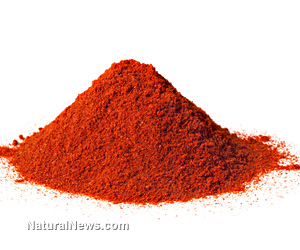
Paprika is a great spice to assist your cardiovascular system
Saturday, February 08, 2014 by: P. Simard
Tags: paprika, cardiovascular health, capsaicin
- Newly released JFK files reveal Pentagon's role in creating Lyme disease and covid in the same lab
- Analysis: The coming economic collapse, a mass uprising and Trump's three secret weapons to halt the growing revolt
- BIGGEST SCAM: You pay income tax, then taxes on purchases, then personal property tax on what you own that you already paid taxes on with taxed money
- The flu vaccine paradox: Are we making things worse?
- SHOCKER: Find out the REAL REASON that USAID was in AFRICA and other developing nations, and it wasn't for education, health or "democracy"
- Trump nominates VACCINE ZEALOT Susan Monarez to lead the CDC, sidelining RFK Jr.'s reform efforts
- BEWARE: USDA allows genetically engineered vaccines to infiltrate organic food production
- The hidden dangers of antibiotics & 10 natural antimicrobials to incorporate into your life
- Hillary Clinton calls for THOUGHT POLICE, echoing her persistent crusade for censorship
- Big Pharma's media takeover: How drug companies bought the news - and your health
- Obama accused of laundering USAID funds to fuel global protest movements, regime change operations
- Tesla, Elon Musk targeted by same useful idiot domestic terrorists that burned and pillaged American cities in 2020
- Federal government censorship – key nodes, and rabbit holes
- Festive flavors: The sweet history, nutritional profile and health benefits of pecan pie
- Trump reverses course on Gaza plan, says “nobody is expelling Palestinians”
- Heads up! List of food shortages expected in 2025 as the campaign of forced starvation continues to be waged against the American people
- Dr. Mike Yeadon releases 15-minute testimony - WATCH - about genocidal intent of COVID “vaccines”
- Survival 101: Effective EMF blocking techniques
- Elon Musk: Aliens could be here on Earth RIGHT NOW
- EPA advisor admits the agency is funneling billions to climate groups ahead of Trump’s return to White House
- Trump reverses course on Gaza plan, says “nobody is expelling Palestinians”
- Reclaim your health: How midlife exercise reverses years of inactivity
- A lack of integrity in Academia: Harvard professor found GUILTY of fraudulent research to promote CRT theory
- Space war brewing? Russia threatens to destroy Starlink satellites
- Big Pharma's $8 Billion bribery scheme exposed: how doctors are pushed to prescribe junk science, not heal
- Mike Adams Sermon 66: God will DESTROY ISRAEL for its wickedness
- Rep. Nancy Mace introduces bill to ban biological males from female facilities on federal property
- Survival 101: Effective EMF blocking techniques
- 5 Simple steps to boost your brainpower: How to strengthen executive function in a distracted world
- Historian warns Israel may be entering an “IRREMEDIABLE DECLINE”
- Florida takes a stand: DeSantis proposes permanent ban on mRNA vaccine mandates
- RFK Jr.'s SSRI antidepressant investigation sparks liberal meltdown, exposes Big Pharma's dangerous game
- New York politicians push bill allowing governor to indefinitely detain the unvaccinated on a whim
- Sales of survival bunkers rise following Russia’s use of the Oreshnik hypersonic ballistic missile
- Pilots report mysterious lights 'moving at extreme speeds' across Oregon skies
- Newly released JFK files reveal Pentagon's role in creating Lyme disease and covid in the same lab
- EPA advisor admits the agency is funneling billions to climate groups ahead of Trump’s return to White House
- The Health Ranger releases “Vaccine Zombie” song and music video, using AI-animated zombies for the music video
- The pandemic as a tool for INDOCTRINATION: Understanding “The Indoctrinated Brain” by Dr. Michael Nehls
- California's social media censorship law struck down: A victory for free speech or a threat to online safety?
- Dr. Mike Yeadon releases 15-minute testimony - WATCH - about genocidal intent of COVID “vaccines”
- Congratulations to the FULLY UNVACCINATED as you resisted the COVID-19 PROPAGANDA MACHINE fueled by over $100 BILLION
- Mike Adams releases country western hit single: Goin’ Back in Time is Comin’ Home
- RFK Jr. clears key hurdle: Sen. Susan Collins backs controversial HHS nominee, signaling a new era for health policy
- Mike Adams releases music poetry sensation: A Child of God
- Mike Adams releases new song and music video: Nothing More Disgusting Than a Globalist
- Unpacking the Lies That We’ve Been Fed – new song and music video released by Mike Adams, the Health Ranger
- Trump administration takes on global censorship: A new frontier for free speech advocacy
- Florida takes a stand: DeSantis proposes permanent ban on mRNA vaccine mandates
- “Why we influenced the 2020 elections”: Facebook files reveal the coordinated effort to bury the Hunter Biden laptop story
- Ex-FBI Chief EXPOSES disgraceful government coverups of Oklahoma City Bombing, Kennedy assassinations, 9/11 WTC, and "Terrorism" as plot to destroy Constitution
- Michigan sheriff announces criminal investigation into 2020 election crimes, Dominion Voting Systems
- Israeli soldiers accused of even more torture and abuse in the West Bank
- Federal judge backs Trump's mass firings, clearing path for government downsizing
- Red Cross issues warning to stop blood plasma donations from vaccinated people
- Scientists confirm: GENIUS brain function can be spontaneously unleashed in humans without any apparent cause
- EPA advisor admits the agency is funneling billions to climate groups ahead of Trump’s return to White House
- HYSSOP: What research reveals about the health benefits of this ancient holy herb
- Two containers with completed ballots fall out of truck in Florida
- Fully vaccinated about to see “tsunami” of illness and death, warns virologist
- Today I asked our AI language model “Neo” about which phytonutrients or phytochemicals can block the spike protein related to SARS-CoV-2 … Here is what it answered…
- Global leaders unite to clamp down on “misinformation” with UN-backed Cascais Declaration
- BREAKING: 2025 NDAA authorizes mandatory military draft of WOMEN across America… as Pentagon pursues global NUCLEAR war with both Russia and China at the same time
- Michael Yon warns of a ZIONIST TAKEOVER in Trump’s second administration
- BOMBSHELL: DNA testing kits are a SCAM to develop ethnic-specific bioweapons
- Ozempic and Wegovy weight loss drugs are injectable LIZARD VENOM PEPTIDES that may unleash a devastating wave of organ failure… side effects align with symptoms of SNAKE BITES
- Israeli soldiers accused of even more torture and abuse in the West Bank
- These 13 countries just signed an agreement to engineer a global FAMINE by destroying food supply
- NASA admits that climate change occurs because of changes in Earth’s solar orbit, and NOT because of SUVs and fossil fuels
- RFK Jr. clears key hurdle: Sen. Susan Collins backs controversial HHS nominee, signaling a new era for health policy
- Sermon 30: How Jesus reveals Caesar’s FAKE CURRENCY and FALSE AUTHORITY
- Coriander seeds: Ancient medicine backed by modern science
Paprika is comprised of many essential nutrients but it's most importantly a great source of vitamin C and carotenoids that are very useful for individuals with vitamin A deficiencies. Some studies have demonstrated that a bell pepper's vitamin C or carotenoid content does increase as it matures. In fact, its antioxidant capacity does seem to proportionately increase as does its vitamin C and carotenoid content.
In December 2009, the British Journal of Nutrition reported a study conducted with animals in order to evaluate paprika's ability to assist the cardiovascular system. The animals were given capsanthin which is a carotenoid component found in paprika. Overall, the animals displayed higher levels of HDL cholesterol, medically known as the good cholesterol, without negatively affecting the triglycerides or the low density lipoprotein levels.
A 2008 study coming from England showed that low blood levels of vitamin C, carotenoids or retinol may favor the development of cataracts. The blood samples of over one thousand North Indian individuals were analyzed. The researchers found that participants had very low antioxidant levels in their blood, especially vitamin C levels in comparison with Western populations. They immediately concluded that a link could be made between an antioxidant-depleted population and the emergence of cataracts.
Can paprika have a positive impact on weight and ingested fat foods?
The journal of Agricultural and Food Chemistry published in its November 2009 issue, a study showing that paprika helped animals lose weight. The animals were given beverages containing paprika for a period of six weeks. It seems like the spice was responsible for activating genes that encourage the production of glycogen. Thanks to paprika, researchers realized that glucose was more efficiently converted into energy and to a greater extent. It was also noted that cholesterol levels were lowered after the six-week trial.Researchers from Pennsylvania State University reported that adding spices to high-fat foods can somewhat help counter their negative effects. A small group of healthy people aged between 30 and 50 participated in this study. Although paprika wasn't the only spice used in their studies, it was nevertheless considered to be amongst the likely top eight herbs known for their potent antioxidant properties. As participants were eating their high fat meals with added spices, blood samples were taken from them every 30 minutes during and after the meals. The general results showed a thirteen percent increase as far as antioxidant activity in the blood, while insulin response dropped by 20 percent following the meals.
Sources for this article include:
http://healthyliving.azcentral.com/paprika-good-health-16978.html
http://www.nydailynews.com
http://www.whfoods.com/genpage.php?tname=foodspice&dbid=50
http://science.naturalnews.com
About the author:
After spending several years working in property management, P. Simard is now focusing on being a naturopath in Quebec.
Paprika at FETCH.news
Get independent news alerts on natural cures, food lab tests, cannabis medicine, science, robotics, drones, privacy and more.
Take Action: Support Natural News by linking to this article from your website
Permalink to this article:
Embed article link: (copy HTML code below):
Reprinting this article:
Non-commercial use OK, cite NaturalNews.com with clickable link.
Follow Natural News on Facebook, Twitter, Google Plus, and Pinterest
Science News & Studies
Medicine News and Information
Food News & Studies
Health News & Studies
Herbs News & Information
Pollution News & Studies
Cancer News & Studies
Climate News & Studies
Survival News & Information
Gear News & Information
News covering technology, stocks, hackers, and more



"Big Tech and mainstream media are constantly trying to silence the independent voices that dare to bring you the truth about toxic food ingredients, dangerous medications and the failed, fraudulent science of the profit-driven medical establishment.
Email is one of the best ways to make sure you stay informed, without the censorship of the tech giants (Google, Apple, Facebook, Twitter, YouTube, etc.). Stay informed and you'll even likely learn information that may help save your own life."
–The Health Ranger, Mike Adams












































